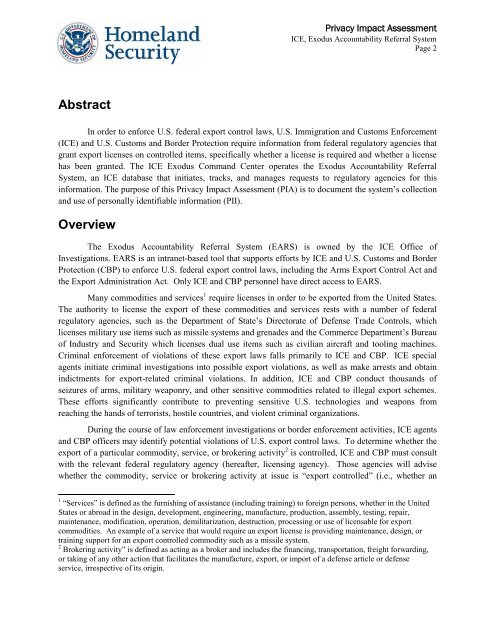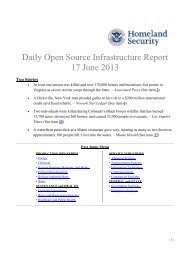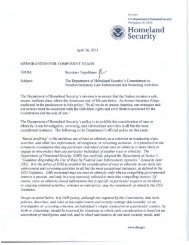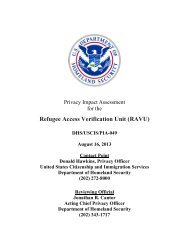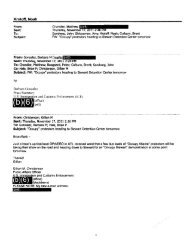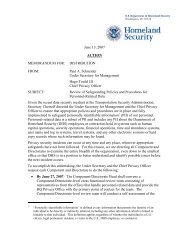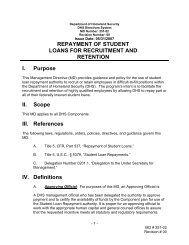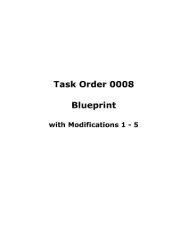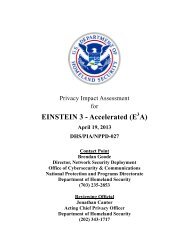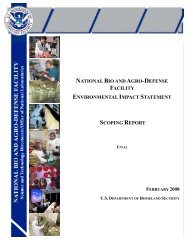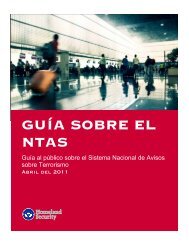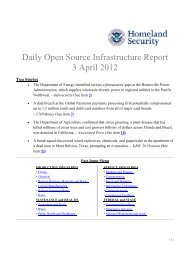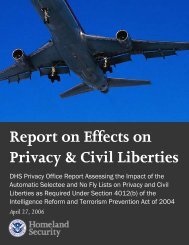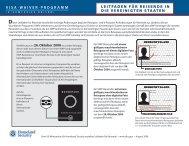Exodus Accountability Referral System (EARS) - Homeland Security
Exodus Accountability Referral System (EARS) - Homeland Security
Exodus Accountability Referral System (EARS) - Homeland Security
Create successful ePaper yourself
Turn your PDF publications into a flip-book with our unique Google optimized e-Paper software.
Abstract<br />
Privacy Impact Assessment<br />
ICE, <strong>Exodus</strong> <strong>Accountability</strong> <strong>Referral</strong> <strong>System</strong><br />
Page 2<br />
In order to enforce U.S. federal export control laws, U.S. Immigration and Customs Enforcement<br />
(ICE) and U.S. Customs and Border Protection require information from federal regulatory agencies that<br />
grant export licenses on controlled items, specifically whether a license is required and whether a license<br />
has been granted. The ICE <strong>Exodus</strong> Command Center operates the <strong>Exodus</strong> <strong>Accountability</strong> <strong>Referral</strong><br />
<strong>System</strong>, an ICE database that initiates, tracks, and manages requests to regulatory agencies for this<br />
information. The purpose of this Privacy Impact Assessment (PIA) is to document the system’s collection<br />
and use of personally identifiable information (PII).<br />
Overview<br />
The <strong>Exodus</strong> <strong>Accountability</strong> <strong>Referral</strong> <strong>System</strong> (<strong>EARS</strong>) is owned by the ICE Office of<br />
Investigations. <strong>EARS</strong> is an intranet-based tool that supports efforts by ICE and U.S. Customs and Border<br />
Protection (CBP) to enforce U.S. federal export control laws, including the Arms Export Control Act and<br />
the Export Administration Act. Only ICE and CBP personnel have direct access to <strong>EARS</strong>.<br />
Many commodities and services 1 require licenses in order to be exported from the United States.<br />
The authority to license the export of these commodities and services rests with a number of federal<br />
regulatory agencies, such as the Department of State’s Directorate of Defense Trade Controls, which<br />
licenses military use items such as missile systems and grenades and the Commerce Department’s Bureau<br />
of Industry and <strong>Security</strong> which licenses dual use items such as civilian aircraft and tooling machines.<br />
Criminal enforcement of violations of these export laws falls primarily to ICE and CBP. ICE special<br />
agents initiate criminal investigations into possible export violations, as well as make arrests and obtain<br />
indictments for export-related criminal violations. In addition, ICE and CBP conduct thousands of<br />
seizures of arms, military weaponry, and other sensitive commodities related to illegal export schemes.<br />
These efforts significantly contribute to preventing sensitive U.S. technologies and weapons from<br />
reaching the hands of terrorists, hostile countries, and violent criminal organizations.<br />
During the course of law enforcement investigations or border enforcement activities, ICE agents<br />
and CBP officers may identify potential violations of U.S. export control laws. To determine whether the<br />
export of a particular commodity, service, or brokering activity 2 is controlled, ICE and CBP must consult<br />
with the relevant federal regulatory agency (hereafter, licensing agency). Those agencies will advise<br />
whether the commodity, service or brokering activity at issue is “export controlled” (i.e., whether an<br />
1 “Services” is defined as the furnishing of assistance (including training) to foreign persons, whether in the United<br />
States or abroad in the design, development, engineering, manufacture, production, assembly, testing, repair,<br />
maintenance, modification, operation, demilitarization, destruction, processing or use of licensable for export<br />
commodities. An example of a service that would require an export license is providing maintenance, design, or<br />
training support for an export controlled commodity such as a missile system.<br />
2 Brokering activity” is defined as acting as a broker and includes the financing, transportation, freight forwarding,<br />
or taking of any other action that facilitates the manufacture, export, or import of a defense article or defense<br />
service, irrespective of its origin.


